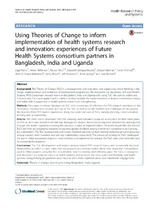| dc.contributor.author | Paina, Ligia | |
| dc.contributor.author | Wilkinson, Annie | |
| dc.contributor.author | Tetui, Moses | |
| dc.contributor.author | Ekirapa-Kiracho, Elizabeth | |
| dc.contributor.author | George, Asha S. | |
| dc.date.accessioned | 2018-01-03T10:15:28Z | |
| dc.date.available | 2018-01-03T10:15:28Z | |
| dc.date.issued | 2017 | |
| dc.identifier.citation | Paina, L. et al. (2017). Using Theories of Change to inform implementation of health systems research and innovation: experiences of Future Health Systems consortium partners in Bangladesh, India and Uganda. Health Research Policy and Systems, 15(2): 109 | en_US |
| dc.identifier.issn | 1478-4505 | |
| dc.identifier.uri | http://dx.doi.org/10.1186/s12961-017-0272-y | |
| dc.identifier.uri | http://hdl.handle.net/10566/3336 | |
| dc.description.abstract | BACKGROUND: The Theory of Change (ToC) is a management and evaluation tool supporting critical thinking in the
design, implementation and evaluation of development programmes. We document the experience of Future Health
Systems (FHS) Consortium research teams in Bangladesh, India and Uganda with using ToC. We seek to understand
how and why ToCs were applied and to clarify how they facilitate the implementation of iterative intervention designs
and stakeholder engagement in health systems research and strengthening.
METHODS: This paper combines literature on ToC, with a summary of reflections by FHS research members on the
motivation, development, revision and use of the ToC, as well as on the benefits and challenges of the process.
We describe three FHS teams’ experiences along four potential uses of ToCs, namely planning, communication,
learning and accountability.
RESULTS: The three teams developed ToCs for planning and evaluation purposes as required for their initial plans
for FHS in 2011 and revised them half-way through the project, based on assumptions informed by and adjusted
through the teams’ experiences during the previous 2 years of implementation. All teams found that the revised
ToCs and their accompanying narratives recognised greater feedback among intervention components and among
key stakeholders. The ToC development and revision fostered channels for both internal and external communication,
among research team members and with key stakeholders, respectively. The process of revising the ToCs challenged
the teams’ initial assumptions based on new evidence and experience. In contrast, the ToCs were only minimally used
for accountability purposes.
CONCLUSIONS: The ToC development and revision process helped FHS research teams, and occasionally key local
stakeholders, to reflect on and make their assumptions and mental models about their respective interventions
explicit. Other projects using the ToC should allow time for revising and reflecting upon the ToCs, to recognise
and document the adaptive nature of health systems, and to foster the time, space and flexibility that health
systems strengthening programmes must have to learn from implementation and stakeholder engagement. | en_US |
| dc.language.iso | en | en_US |
| dc.publisher | BioMed Central | en_US |
| dc.rights | © The Author(s). 2017 Open Access This article is distributed under the terms of the Creative Commons Attribution 4.0
International License (http://creativecommons.org/licenses/by/4.0/), which permits unrestricted use, distribution, and
reproduction in any medium, provided you give appropriate credit to the original author(s) and the source, provide a link to
the Creative Commons license, and indicate if changes were made. The Creative Commons Public Domain Dedication waiver
(http://creativecommons.org/publicdomain/zero/1.0/) applies to the data made available in this article, unless otherwise stated. | |
| dc.subject | Theory of change | en_US |
| dc.subject | Learning by doing | en_US |
| dc.subject | Bangladesh | en_US |
| dc.subject | India | en_US |
| dc.subject | Uganda | en_US |
| dc.title | Using Theories of Change to inform implementation of health systems research and innovation: experiences of Future Health Systems consortium partners in Bangladesh, India and Uganda | en_US |
| dc.type | Article | en_US |
| dc.privacy.showsubmitter | FALSE | |
| dc.status.ispeerreviewed | TRUE | |

